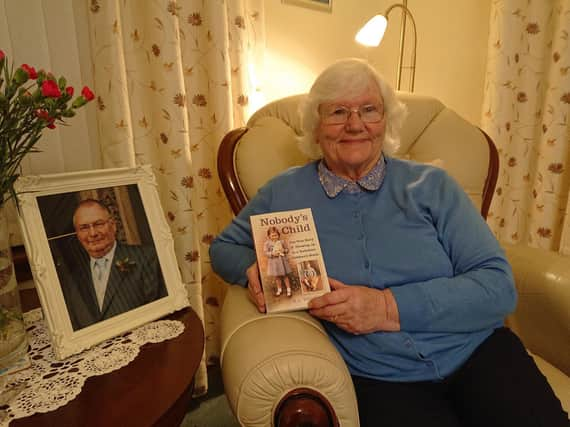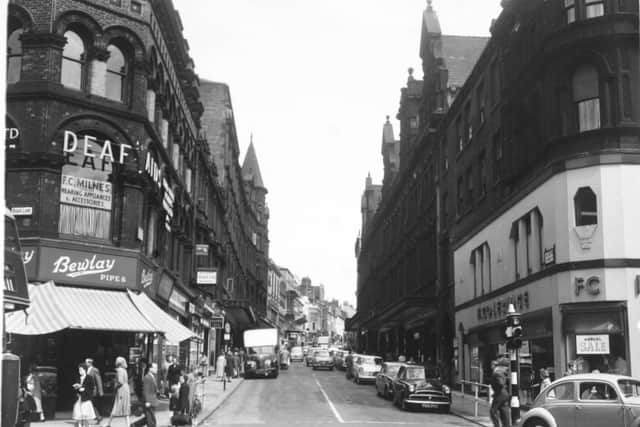'You are not a nobody's child' - Author's heartfelt message to children in care after publishing memoir on life in Yorkshire children's home in the 1950s


There were two questions that Gloria Urquhart sought desperately to answer during her childhood in Leeds – Who was she? And where was her brother Kevin?
Taken into care two months before her fourth birthday, all she knew was her name.
Advertisement
Hide AdAdvertisement
Hide AdThe hand of her baby brother “no longer squeezed mine as it had so often done”, she recalls, “but that memory would live on in the deepest recesses of my mind and heart”.


Now aged 74, Gloria has written a powerful memoir, shedding light on her experiences in a children’s home in the 1950s and following her compelling journey into adolescence and to finding true happiness with a family of her own.
“I suppose that it is history – my history,” she says of Nobody’s Child: The True Story of Growing up in a Yorkshire Children’s Home, published by The History Press.
“Over the years, friends have encouraged me to put it into writing. I feel that the very act of writing, sometimes with the tears flowing, has helped me to come to terms with what’s happened [in my life].”
Advertisement
Hide AdAdvertisement
Hide AdGloria spent the majority of her childhood in children’s homes in Rothwell and Ireland Wood in Leeds. After being taken into the care system, she writes in the book of feeling sadness and “a deep sense of rejection”.
Looking back now, she speaks of “absolute loneliness in a crowded place”.
“Children in those days were not cuddled in the way they were in later years,” she says. “But children in care just need the same as any other child. They need to be able to go to somebody’s knee and talk to them.
“They need to be hugged and told they’re loved. They need to be able to go to someone tearfully if they wish to cry.”
Advertisement
Hide AdAdvertisement
Hide AdThere were two people in particular that Gloria wanted to highlight in her memoir. Sisters Auntie Agnes and Auntie Cissie, as they were known to her, came into Gloria’s life through a fostering process.
From the age of six, she began seeing them at weekends and when she was 14, she spent a period living with them at their home in Holbeck.
“It was the love of these two elderly ladies that I really wanted to put forward into the book,” Gloria says.
“It was unusual for people of their circumstances and ages - they were in their 60s - to be able to foster a child.
Advertisement
Hide AdAdvertisement
Hide Ad“They were single, they lived in a very tiny little house, which didn’t have a spare bedroom for me.
“Everything pointed against them caring for me, except their love for me and my bond with them. They were just wonderful people.”
Their kindness and care, says Gloria, helped to shape who she has become.
“They showed me what kindness was. They also taught me how to extend that kindness to other people.
Advertisement
Hide AdAdvertisement
Hide Ad“For instance, taking flowers to an older person or visiting them with a cake, the sort of things children are doing today in Covid times.
“I was also encouraged to look at people as people, not by their faults or their failings, but as human beings with a need.”
The women would take her on day trips, opening her eyes to life beyond Leeds.
Gloria recalls with fondness days out from Leeds station to Harrogate, Knaresborough and rural Yorkshire. Living with them gave her for the first time a sense of belonging.
Advertisement
Hide AdAdvertisement
Hide Ad“It was wonderful, I can’t describe it any other way. It made me feel a real person with an identity,” she says.
“I was able to go out with somebody that I could call my own. I felt this wonderful sense of freedom going into the countryside and a joy at belonging to somebody.
“I remember walking alongside [Auntie Agnes] and going into shops with her. Very often we could only look because she couldn’t afford to buy but she would point out nice things to me like clothing and china.
“She showed me culture as well. We went to concerts at Leeds Town Hall. I didn’t have a lot materially, but I had a lot socially and emotionally.”
Advertisement
Hide AdAdvertisement
Hide AdIn her teens, Gloria tracked down some of her birth relatives.
Throughout the book, she talks about her desperation to find her brother Kevin, from whom she became separated when they were taken into the care system. When she was 15, she learnt he had been adopted.
Gloria had many difficult decisions to make when searching for Kevin, which she outlines in detail within the book.
Whenever she moved address, she ensured her details were filed on care system records, alongside a note to say she was open to speaking to her birth relatives.
Advertisement
Hide AdAdvertisement
Hide Ad“People who are adopted either accept that they are adopted and have a new family and stop and are content with that, or they might want to know more information about their birth family,” she says.
Gloria trained as a nurse in London where she met, fell in love with and married her late-husband Robert, later moving to Scotland. She spent her working life in nursing, social work and psychiatry.
“Robert’s caring nature and acceptance of me as a person with hopes and aspirations helped me to overcome many of the early feelings of rejection,” she writes in the book.
It was with his encouragement that she began the memoir, drawing on her own recollections, alongside letters, newspaper clippings and her social work records.
Advertisement
Hide AdAdvertisement
Hide AdTen years in the making, the book deals with her thoughts and memories of her life’s tragedies as well as the good friends, family and experiences with which she feels she has been blessed.
Through her words, she takes readers with her on her journey to discover her own identity and her quest to trace her little brother.
She was conscious, she says, when writing parts of it, that the book may offer an insightful perspective for social workers in the care system today.
“I would say to modern day authorities, be honest with children and allow, wherever possible, siblings to at least know who they are and have as much contact, if the circumstances allow,” she says.
Advertisement
Hide AdAdvertisement
Hide AdRemembering how for many years she felt “unwanted”, Gloria says she also wants to remind every young person in the care system that “you are special”.
“To every young person that is going through the care system, be courageous, look forward with hope and look forward and positively to your life, not the people’s lives before you, and what you’re going to make of things.
“And remember you are not a nobody’s child, you are somebody.”
Nobody’s Child: The True Story of Growing up in a Yorkshire Children’s Home is out now.
Advertisement
Hide AdAdvertisement
Hide AdSupport The Yorkshire Post and become a subscriber today. Your subscription will help us to continue to bring quality news to the people of Yorkshire. In return, you'll see fewer ads on site, get free access to our app and receive exclusive members-only offers. Click here to subscribe.